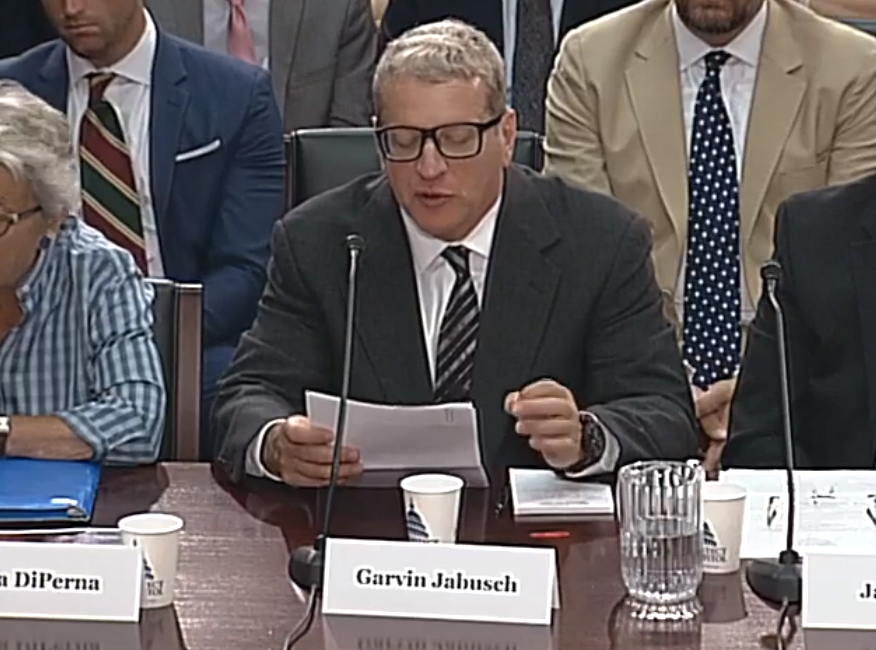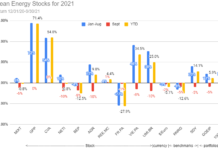The prepared remarks of Garvin Jabusch, Chief Investment Officer of Green Alpha Advisors before the House Select Committee on the Climate Crisis in Washington, DC, July 25th, 2019.

Chairwoman Castor, Ranking Member Graves, committee members, thank you for the opportunity to testify and contribute to this important conversation.
Climate disruption and resource degradation present significant threats to and opportunities for American business. Every sector and industry are affected, and my industry of asset management, in its role deploying capital across the economy, is directly exposed to it all, risks and opportunities inclusive.
First, risks. The purpose of investing is to preserve and grow one’s purchasing power. Whatever amount I am investing, I want to be able to buy as much or more with its value in the future than I could have with its cash value today. There are volumes of portfolio theory about how to achieve this, and, overall, those theories have worked well for decades. But many theories of the world work great, until the world changes. Now, the change is climate disruption, and in the full exercise of fiduciary responsibility as an asset manager, I have to think hard about the effects that climate disruption will have on every business I consider placing my clients’ assets into, and inversely, the effect each business may have upon the climate. It is in doing this analysis, no longer optional for the prudent risk manager, that I can minimize investment risk and grow my clients’ purchasing power into the future.
What is the practical application of this? It begins with the realization that even within asset management, it is science that is our path to knowing things. Science tells us that many of our present economic activities, such as fossil fuel development, internal combustion engine manufacture, fossil powered electricity generation, and use of topsoil depleting chemicals, have to decline dramatically, and soon. Thus, the prudent fiduciary knows that holding the securities of companies pursuing these activities is likely to put his or her client assets at risk, particularly in the medium and long terms.
According to experts such as the Federal Reserve of the U.S., former Bank of England governor Mark Carney and noted investor Jeremy Grantham, climate has emerged as “bar none” the most important risk in asset management, and the main threat to investments today is in holding the causes of the climate crisis. To de-risk a portfolio, it is necessary to not own the primary threats undermining economic stability.
Those are the risks within my industry. The main risk to the climate coming from my industry is that the predominant way of investing today completely ignores the climate crisis. A recent CNBC article explains that “80% of the stock market is now on autopilot…Passive investments control about 60% of the equity assets, while quantitative funds — using trend-following models instead of fundamental research — account for 20% of market share.” This means that today, the main reason a stock is bought is because it is in an index, and not because of what the company makes or what services it provides. This is dangerous because the major indices are riddled with the causes of our largest environmental and therefore economic risks. The S&P 500 includes approximately 60 fossil fuels related companies and any number of other risks to water, topsoil and economic equality, to mention a few.
Let me be clear: if you own the S&P 500 today, you may believe you are investing passively, but you are not. You are making an active bet on the causes of system-level collapse. By your actions, if not your intent, you are signaling that you hope to benefit from causing climate disruption and resource degradation. Climate is the most important risk to capital preservation, yet the main overall risk coming from the investment industry is that the vast majority of professionals and their clients are flat ignoring it.
There are those in investment management working to change this, my firm Green Alpha Advisors, among them. It sounds simple to invest for a more sustainable economy, but the problem has been that investment managers don’t have good principles to guide them. Green Alpha’s approach to de-risking portfolios has been to select stocks not because of their presence in a benchmark index, but because of what the company actually does. We believe the best way to begin, and the clearest line of sight, is to look at sources of revenues. Is a company being paid to de-risk the global economy, or is it being paid to help drive it towards the edge? Are the majority of revenues coming from business activities that will help society mitigate or adapt to the climate crisis, or from causing it?
Rather than blindly indexing, investment professionals have to get back to judging individual cases on their merits; and we can use disinterested, objective principles to make better choices. If a company’s net activities do not lower the risk profile of the economy on an ongoing basis, we should wonder why we own it. You get the economy you invest in, and as long as most investors still own the S&P 500, we are going to be living in the fossil fuels economy that it represents.
Those are the risks in and from my industry, and how to avoid them. What about the opportunities? This is the good news, and I think it is generally underappreciated.
Human innovation is increasing in an unprecedented way, and the rate of that increase itself is accelerating. Faster and faster, we’re coming into possession of the means to both mitigate climate disruption, and to adapt to what we have already committed ourselves to. Why? Because innovation means doing things better. It means, as it always has meant, making economic production more efficient: getting more output out of ever fewer inputs. As biologist Edward O. Wilson, who testified here on the Hill just a couple days ago, has noted, the digitalization of the economy is key to achieving environmental sustainability, because the associated expanding efficiency of production can shrink our ecological footprint. But of course indefinite sustainability isn’t emerging only from digitalization, we are also today seeing great strides in advanced materials, biotech, renewable energy and storage, zero emissions transportation, water management, and in key adaptations like indoor agriculture. Investing in these efficiency solutions will lead to competitive performance returns as these innovators continue to gain market share from their legacy economy predecessors, and thus grow faster.
Economic production can be much greater than it is today while consuming far fewer inputs, be those inputs natural resources, person hours or dollars, and can do so with far fewer externalities like greenhouse gasses and other pollution. This will lead to enormous wealth creation opportunities for investors, and will also put us on the path to indefinite sustainability, meaning we can realize a good standard of living for everyone – the 100% – without overtopping earth’s tolerances. The greatest wealth preservation and growth opportunities for my firm come from that; from keeping our eye on, and investing for, that endgame: namely, for a zero-risk economy.
Garvin Jabusch is co-founder and chief investment officer of Green Alpha Advisors. For more information, please visit https://greenalphaadvisors.com/about-us/legal-disclaimers/.








